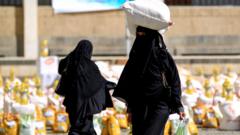The recent U.S. deportation efforts have led to a controversial situation where hundreds of migrants from politically unstable regions are being held in Panama, raising concerns over their safety and the implications for U.S.-Panama relations.
U.S. Deportations Leave Migrants Stranded in Panama: Analyzing the Impact and Reactions

U.S. Deportations Leave Migrants Stranded in Panama: Analyzing the Impact and Reactions
Hundreds of migrants deported from the U.S. are currently held at a hotel in Panama, grappling with uncertain futures and potential dangers from their home countries.
In a striking turn of events, hundreds of deportees from the United States find themselves confined in Panama's Decapolis Hotel, stranding them away from their families and exposing them to dire conditions. The group includes individuals from countries like Afghanistan, Iran, and China, fleeing life-threatening crises in their homelands.
Upon their arrival in Panama, these migrants shared their harrowing experiences, detailing the trauma of detention by the U.S. military and the abrupt expulsion from what they hoped would be a sanctuary. Many reported being stripped of their passports and most personal belongings, including cellphones, limiting their access to legal support amidst their volatile circumstances.
Reports from within the hotel reveal alarming instances of desperation: a suicide attempt, serious injuries in escape attempts, and a distressing message from a migrant expressing hopelessness. Concerns have been raised about the legality and humanity of such mass deportations, highlighting the moral implications of relocating vulnerable populations to a less familiar territory.
Trump's administration is facing intense scrutiny over these sweeping deportation practices, particularly in how it deals with migrants from nations that are reluctant to accept deportees due to political tensions or instability. The decision to send these individuals to Panama—in light of Trump's warnings about potential economic consequences—has sparked a debate over the ethics of leveraging political influence at the expense of human rights.
Critics argue that forcing Panama to accommodate scores of deportees creates a dangerous precedent, putting pressure on a country that may not have the resources or framework to adequately support them. On the other hand, supporters may contend that this is a necessary measure to deter illegal immigration and further border crises.
As the situation continues to develop, it raises fundamental questions about the responsibilities of nations towards refugees and migrants, the role of international agreements in handling deportations, and the broader implications for U.S. foreign relations, particularly in regions already fraught with geopolitical tensions. The futures of those stranded in Panama remain uncertain, with calls for immediate intervention to ensure their safety and legal rights growing louder.
Upon their arrival in Panama, these migrants shared their harrowing experiences, detailing the trauma of detention by the U.S. military and the abrupt expulsion from what they hoped would be a sanctuary. Many reported being stripped of their passports and most personal belongings, including cellphones, limiting their access to legal support amidst their volatile circumstances.
Reports from within the hotel reveal alarming instances of desperation: a suicide attempt, serious injuries in escape attempts, and a distressing message from a migrant expressing hopelessness. Concerns have been raised about the legality and humanity of such mass deportations, highlighting the moral implications of relocating vulnerable populations to a less familiar territory.
Trump's administration is facing intense scrutiny over these sweeping deportation practices, particularly in how it deals with migrants from nations that are reluctant to accept deportees due to political tensions or instability. The decision to send these individuals to Panama—in light of Trump's warnings about potential economic consequences—has sparked a debate over the ethics of leveraging political influence at the expense of human rights.
Critics argue that forcing Panama to accommodate scores of deportees creates a dangerous precedent, putting pressure on a country that may not have the resources or framework to adequately support them. On the other hand, supporters may contend that this is a necessary measure to deter illegal immigration and further border crises.
As the situation continues to develop, it raises fundamental questions about the responsibilities of nations towards refugees and migrants, the role of international agreements in handling deportations, and the broader implications for U.S. foreign relations, particularly in regions already fraught with geopolitical tensions. The futures of those stranded in Panama remain uncertain, with calls for immediate intervention to ensure their safety and legal rights growing louder.























